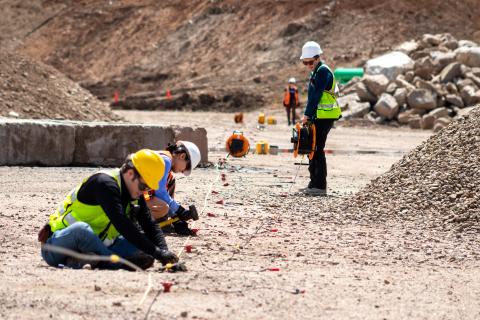All Categories
Featured
Table of Contents
Geophysical Surveys For Planning & More in Two Rocks Aus 2022
Are you looking for the ideal kind of b-school? Get in touch with MBA programs looking for candidates like you. Explore schools of all sizes, ranked colleges, city and big-campus schools and more. Apply. Pay. Prep. Study. Be successful. We've got you covered. Get in touch with master's programs around the nation to get an edge over the competition.

A geophysicist research studies various aspects of the earth. According to the U.S. Geological Study, they study gravity, magnetic, electrical, and seismic activity occurrences. Geophysicists also document, evaluate, and take measurements of geographic features and abnormalities. Enjoy a video to learn what a geophysicist: Geophysicists must earn a minimum of a bachelor's degree; however, this is for an entry-level position.
Advanced degrees require more specific studies in the specialized of option. Job potential customers are higher if you have a strong background in computer system science or technology.
Marine Geophysical Surveys in Seville Grove Aus 2023
Access to these opportunities may be restricted depending on where you live; however, internships or summer programs with geophysical companies, university geophysics department, or the U.S. Geological Study can be alternatives. You can find a list of a list of chances on the United States Geological Study (USGS) websites' Path Programs tab (opens in another link).
If you have yet to graduate high school, taking as many science and math classes as possible would be a plus. Geophysicists likewise work with computer systems while investigating, so computer system courses can also be valuable, as pointed out earlier in this post. Lots of geophysicists concentrate on a location of geophysics. For that reason, the task description would change pending on the specialty.
A geophysicist's tasks can include measuring, tracking, and documenting information from various physical residential or commercial properties on earth. Geophysicists frequently have to take a trip worldwide to analyze geological occasions that have actually happened or may have been predicted.
Geophysical Survey Equipment - Ground Penetrating Radar in Bullsbrook Oz 2020
Jay Wellik, a geophysicist, studies volcanos. His area of proficiency in geophysics is looking into why volcanos emerge and what indicators there might be that an eruption might happen. He tracks seismic activity and then follows what happens in the past, throughout, and after a volcano appears. Geophysicists generally work full-time hours; however, they typically work irregular hours, as discussed formerly.

You can discover extra info about Geophysicists along with extra educational products on the U.S. Geological Study site (links open in a new window). Laura Stern, of the U.S. Geological Study at the Gas Hydrates Lab in Menlo Park, California: We make a number of various hydrates in the laboratory.
We also make carbon dioxide hydrate, ethane hydrate, lp, a number of various structures. It's about 100 degrees cooler than the temperature at which these hydrate samples would dissociate, when they would decompose to ice plus gas on the tabletop.
Geophysical Engineerskills And Knowledge in Merriwa WA 2022
They look like snow, it looks like compressed snow but truthfully, it does consist of gas inside. It's reverting to ice plus gas and then as the ice would melt as it continues to warm, it will end up being water plus gas.
My name is Steve Kirby, I'm a Geophysicist here at the U.S. Geological Survey in Menlo Park. I work with Laura Stern who is also a Geophysicist in this lab that adheres towards the examination of planetary ices and gas hydrates. Gas hydrates in nature happen in extremely remote locations and they are extremely intricate with the interactions and conditions that they form under and samples that are raised are under some sort of alternation or decomposition.
This is an uncommon lab and there are just a handful of them worldwide and we are really fortunate to be here at the Geological Survey and to have the chance of dealing with them. Bureau of Labor Stats, U.S. Department of Labor, Occupational Outlook Handbook, Geoscientists. National Center for O * Web Advancement.
Services Geophysical in Fremantle WA 2022
00. O * NET On, Line. This video was produced by the government for the U.S. Geological Survey. The USGS Gas Hydrates Lab is moneyed by the Department of Energy and the USGS Gas Hydrates Project.
Latest Posts
Where Can A Geophysicist Work Other Than The Oil Industry? in Ellenbrook Oz 2021
Geophysicist in Como Aus 2022
Geophysical Surveys Definition & Meaning In Stock ... in Karrinyup Aus 2022